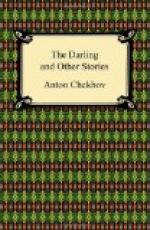Soon the friends grew accustomed to the darkness, and were able to distinguish the outlines of the tall pines and telegraph posts. From time to time the sound of whistles reached them from the station and the telegraph wires hummed plaintively. From the copse itself there came no sound, and there was a feeling of pride, strength, and mystery in its silence, and on the right it seemed that the tops of the pines were almost touching the sky. The friends found their path and walked along it. There it was quite dark, and it was only from the long strip of sky dotted with stars, and from the firmly trodden earth under their feet, that they could tell they were walking along a path. They walked along side by side in silence, and it seemed to both of them that people were coming to meet them. Their tipsy exhilaration passed off. The fancy came into Yartsev’s mind that perhaps that copse was haunted by the spirits of the Muscovite Tsars, boyars, and patriarchs, and he was on the point of telling Kostya about it, but he checked himself.
When they reached the town gate there was a faint light of dawn in the sky. Still in silence, Yartsev and Kotchevoy walked along the wooden pavement, by the cheap summer cottages, eating-houses, timber-stacks. Under the arch of interlacing branches, the damp air was fragrant of lime-trees, and then a broad, long street opened before them, and on it not a soul, not a light. . . . When they reached the Red Pond, it was daylight.
“Moscow—it’s a town that will have to suffer a great deal more,” said Yartsev, looking at the Alexyevsky Monastery.
“What put that into your head?”
“I don’t know. I love Moscow.”
Both Yartsev and Kostya had been born in Moscow, and adored the town, and felt for some reason antagonistic to every other town. Both were convinced that Moscow was a remarkable town, and Russia a remarkable country. In the Crimea, in the Caucasus, and abroad, they felt dull, uncomfortable, and ill at ease, and they thought their grey Moscow weather very pleasant and healthy. And when the rain lashed at the window-panes and it got dark early, and when the walls of the churches and houses looked a drab, dismal colour, days when one doesn’t know what to put on when one is going out—such days excited them agreeably.
At last near the station they took a cab.
“It really would be nice to write an historical play,” said Yartsev, “but not about the Lyapunovs or the Godunovs, but of the times of Yaroslav or of Monomach. . . . I hate all historical plays except the monologue of Pimen. When you have to do with some historical authority or even read a textbook of Russian history, you feel that every one in Russia is exceptionally talented, gifted, and interesting; but when I see an historical play at the theatre, Russian life begins to seem stupid, morbid, and not original.”




